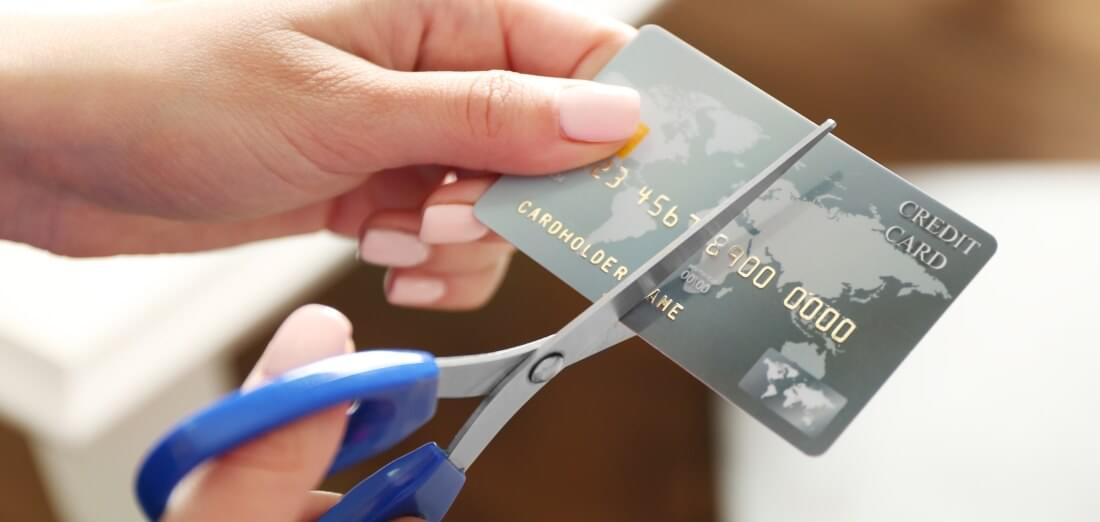
Closing down a credit card will usually hurt your credit score, especially if you’ve had the credit card open for many years. If you no longer want to use a particular credit card, you don’t have to close it down. There are other options out there to prevent you from using the card and accumulating high balances.
Let’s explore why it’s a bad idea to close down your credit card.
Credit Score Impact
Some 15% of your credit score accounts for the length of your credit history. The credit bureaus, which tabulate the score, want to see a lengthy credit history. It gives them a better sense of how well you manage credit. Plus, the more experience you have managing credit, the less likely you are to default on a credit card down the line.
By closing down a credit card, you are reducing the scope of history that the credit bureaus can consider. If you don’t have credit card debt, the damage to your score from closing down a credit card that you’ve had for years won’t be monumental. Again, only 15% accounts for credit history length.
But if you have debt, closing down a credit card will likely raise your utilization ratio, which accounts for 30% of your score. Your utilization ratio is how much you owe across all the different credit cards you have vs. the available credit limit you have access to.
Let’s say you have two credit cards, each with a $10,000 credit limit and a $5,000 debt balance. You also have a third credit card with no debt balance and a $3,000 credit limit. That means your total debt is $10,000 (5,000 + 5,000) and your total credit limit is $23,000 (10,000 + 10,000 + 3,000). In this scenario, your utilization ratio is about 43% (10,000 divided by 23,000). This is rather high and will start to damage your credit score.
If you close down the third credit card (the one with the $3,000 credit limit), your utilization ratio will increase dramatically. It will now be 50% (10,000 divided by 20,000). You just lowered the amount of available credit limit you have access to by closing down that third credit card. Now you will have to work even harder to pay off that $10,000 debt balance to get your utilization ratio to decrease and your credit score to increase.
Remember, a high credit score is one of the most important financial achievements. A high credit score gives you a better chance of being approved for a mortgage or car loan. It will also unlock a lower interest rate on these loans, which means lower monthly payments. On the flip side, a low credit score will likely mean a higher interest rate on these loans.
Cut Up the Credit Card
If you want to close down the credit card to reduce the temptation to use it, simply cut up the card instead. There’s no need to close down the actual account. You can literally cut the card in half to prevent yourself from ever being able to swipe it in the store.
Some consumers want to close down the credit card to stop paying its annual fee. That is a valid reason. Many credit cards have annual fees ranging from as little as $100 a year to as much as $500 a year. The annual fee is simply a fee paid once per year just to keep the card open — whether you’ve been using the card or not. As long as the account is open, you’ll continue to pay the annual fee.

Again, if you have no debt, the impact of closing down a credit card isn’t that substantial. You’ll notice the decrease in your credit line, but it likely won’t impact your score much. Plus, unless you’re in the market for a mortgage or car loan in the next year, a slightly lower credit score isn’t going to matter that much. And it doesn’t make sense to throw money away on an annual fee for a card you don’t use.
However, this is an important lesson: try yo find credit cards with no annual fee if you don’t want to pay it every year. While they may have fewer perks, such as access to airport lounges, you’ll end up saving thousands of dollars from not paying the annual fee all those years. Plus, if you find that you’re not using the credit card in the future, you won’t feel pressure to close down the card if it doesn’t have an annual fee. It’s okay to have idle credit cards as long as there is no fee and you’re not throwing money down the drain.
Why Are You Opening Up a Particular Credit Card?
This whole notion of closing down a credit card account raises an important question about why you even opened up the credit card in the first place. Was it just for the
Before you open up a credit card, devise a game plan. Ask yourself why you’re opening up this particular credit card and how long you plan to hold it. Also look into the fees associated with the credit card you are considering. Will the reward perks that the credit card offers outweigh the annual fees?
Opening up a credit card is a financial decision that can have a lasting impact. If you’re not careful, a few wrong moves can end up costing you plenty of money in the long-run, especially if you are in the market for a big financial purchase, such as a home or a car.






